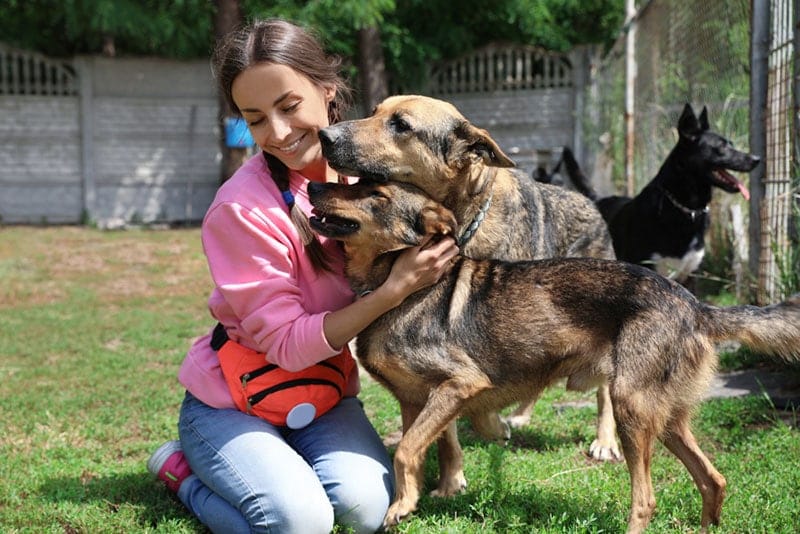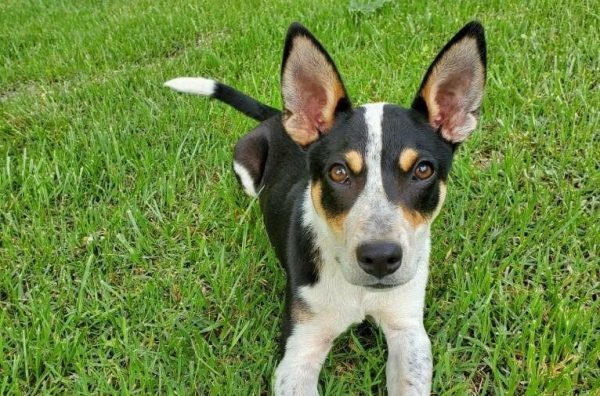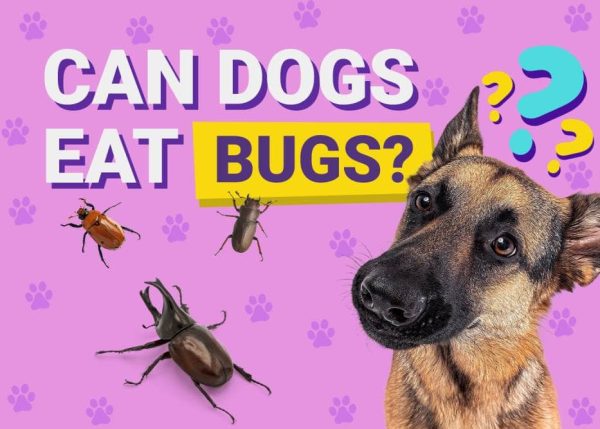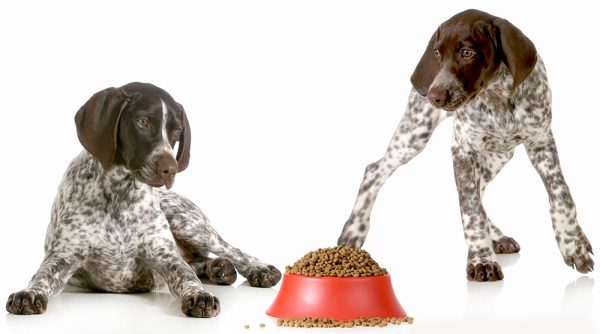In this article
In recent years, the number of people adopting dogs has significantly increased as they look for the companionship and joy that a furry friend can bring into their lives. While the emotional benefits of dog ownership are immeasurable, potential pet parents often wonder about all the financial aspects of adopting a dog.
The initial costs that come with adopting a dog are approximately $670–$2,320, but there are other costs to consider. In this comprehensive guide, we will explore the various costs associated with dog adoption, especially the direct and indirect expenses associated with bringing a new canine companion into your home.

Bringing Home a New Dog: One-Time Costs
The adoption fee is one of the primary costs associated with dog adoption. This fee varies widely and is influenced by factors such as the dog’s breed, their age, and the specific policies of the adoption organization.
Rescue shelters, breed-specific rescue organizations, and animal welfare groups charge adoption fees to cover the expenses related to the dog’s medical care, vaccinations, spaying or neutering, and other initial necessities. Potential adopters should be prepared to inquire about and understand these fees, which can cost a few hundred dollars.

Initial Setup and Supplies
- $670–$2,320
Adopting a dog is less expensive than purchasing a dog from a breeder, but both avenues come with significant initial costs for setup and supplies. From grooming to medical care to safety tools, your dog will need quite a few items to get set up for a happy and healthy life.
List of Dog Care Supplies and Costs
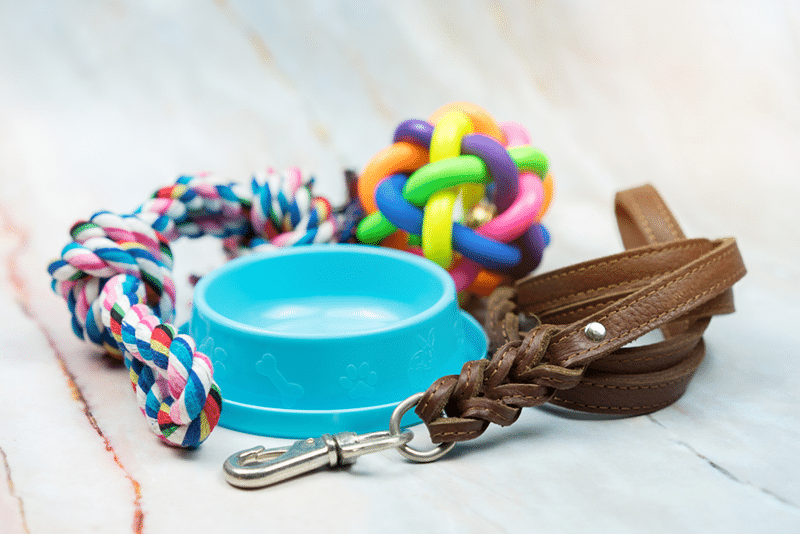
| ID Tag and Collar | $5–$50 |
| Spay/Neuter | $35–$130 |
| X-Ray Cost | $75–$450 |
| Ultrasound Cost | $300–$1,000 |
| Microchip | $40–$70 |
| Teeth Cleaning | $150–$400 |
| Bed | $20–$60 |
| Nail Clipper (optional) | $5–$20 |
| Brush (optional) | $5–$15 |
| Crate (optional) | $20–$100 |
| Blanket (optional) | $10–$40 |
| Toys | $5–$40 |
| Carrier | $20–$60 |
| Food and Water Bowls | $10–$25 |
How Much Does a Dog Cost per Month?
- $280–$740
Like paying rent or a mortgage, a dog comes with monthly costs. Monthly costs for a dog typically include food, averaging $30 to $60, depending on the size of the dog and type of food. Veterinary care, such as routine check-ups and preventive medications, range from $30 to $100 per month. If done professionally, grooming costs can add another $30 to $50. Treats, toys, and other supplies might total $20. Pet insurance can cost $20 to $50 monthly. License fees, training classes, and occasional pet services may contribute to additional expenses.
In total, monthly dog care costs can range from $280 to $740.
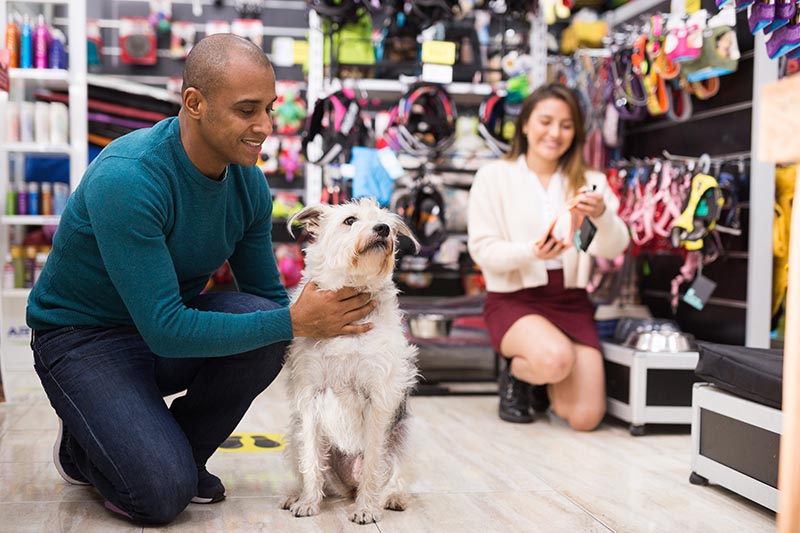
Health Care
- $120–$320
Health care has a wide cost range because pet owners should expect the unexpected. Healthcare costs also cover vaccines and boosters. Thankfully, vaccines are often only needed once every 1 to 3 years. However, you’ll need to take your dog to the vet for yearly checkups and may need medication for allergies or other minor conditions.
Food
- $30–$60
The cost of dog food per month varies based on factors like the dog’s size, breed, type of food, and dietary needs. On average, dry commercial dog food for a medium-sized dog costs $30 to $60 per month. Specialized or premium dog food brands can cost more, reaching $80 or higher. Large breeds or dogs with specific dietary requirements will likely incur higher costs. Homemade, wet food, or raw food diets could also increase your expenses.
Considering factors like nutritional content and your dog’s health, the monthly cost of dog food can fluctuate, but choosing a balanced and appropriate diet within your budget is essential.
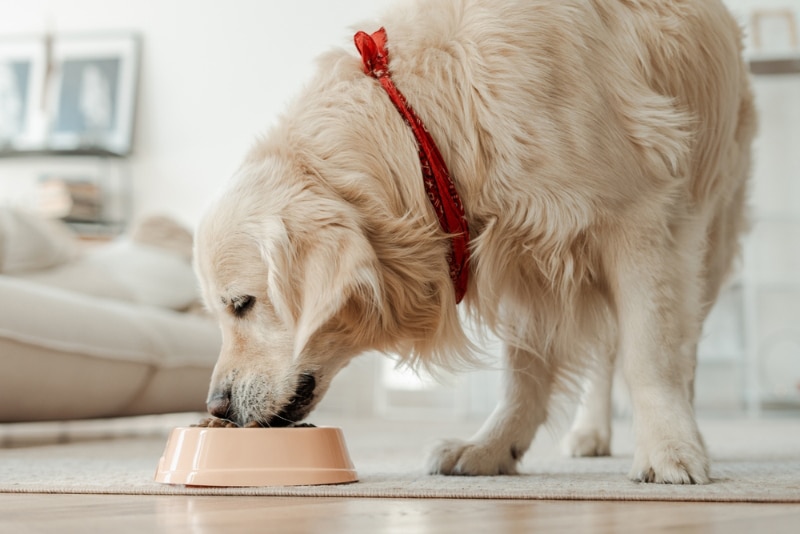
Grooming
- $10–$90
The monthly cost of dog grooming depends on the dog’s size, breed, coat type, and specific grooming needs. Professional grooming services typically range from $30 to $90 per session. For dogs requiring frequent grooming, monthly costs can add up.
DIY grooming at home with basic supplies, including brushes, nail clippers, and shampoo, can reduce expenses, averaging $10 to $30 per month. Specialized grooming, such as breed-specific cuts or spa treatments, incur higher costs. Regular grooming is essential for a dog’s health, and the grooming approach should align with the dog’s needs and the owner’s budget.
Medications and Vet Visits
- $60–$120
The monthly cost of medical care for a dog varies based on age, health condition, and preventive measures taken. Routine veterinary care, including vaccinations and check-ups, can range from $30 to $50 monthly. Preventive medications, such as flea and tick preventatives, may cost an additional $10 to $20 monthly. You’ll pay more if your dog requires prescription medications or special diets. If you get pet insurance, you’ll $20 to $50 a month, depending on the policy.
Overall, the average monthly medical care cost for a healthy dog can range from $60 to $120, but specific needs may increase these expenses.
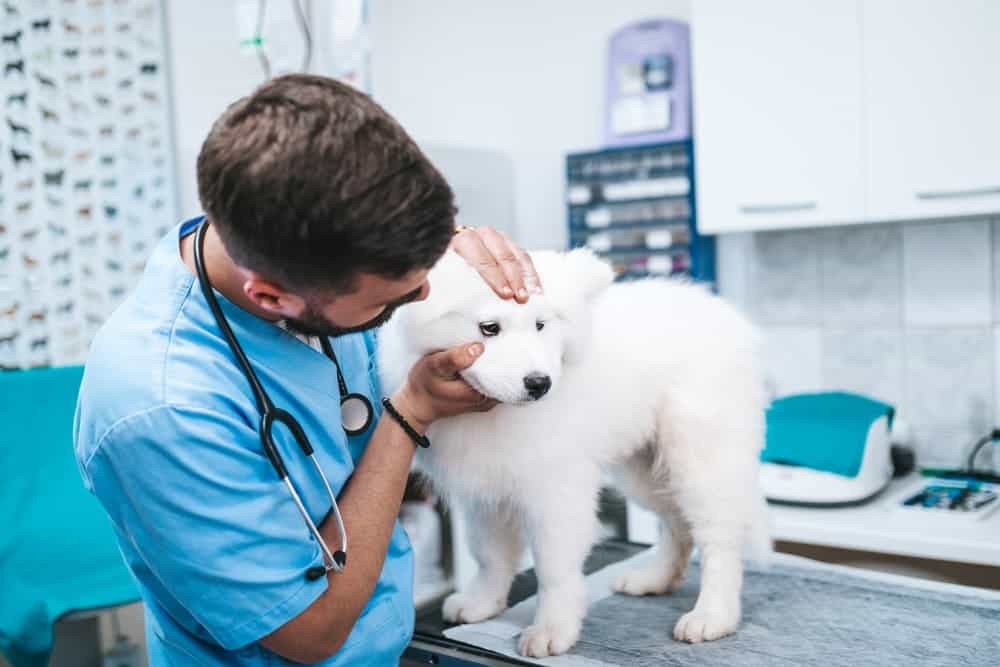
Pet Insurance
- $20–$50
Pet insurance costs vary based on the pet’s age, breed, and coverage plan. On average, monthly premiums for pet insurance can range from $20 to $50. Basic plans covering accidents and illnesses are more affordable, while comprehensive plans, including preventive care and hereditary conditions, cost more. Deductibles and reimbursement percentages also impact pricing. Older pets and certain breeds have higher premiums. When choosing pet insurance, it’s essential to research different providers, compare plans, and consider your pet’s specific needs.
The investment in insurance helps offset unexpected veterinary costs and ensures comprehensive care for your pet.
Environment Maintenance
- $20–$60
Maintaining a cozy home environment for a dog is probably the least expensive aspect of owning a pet. All they need is a bed and blanket to call their own (although you may find they prefer sleeping wherever you are!). However, you may have to replace a few items if your dog is an aggressive chewer.

Entertainment
- $20–$40
Dog toys are essential to prevent boredom but are not always the most durable. You’ll find yourself replacing them very regularly. Many owners have invested in dog toy subscription boxes to offset the cost of repeatedly buying toys in stores. The cost of a dog toy subscription box varies depending on the brand, the number of items included, and the quality of the toys.
On average, monthly subscription boxes for dog toys can range from $20 to $40. Some companies offer plans with different pricing tiers based on the dog’s size or the subscription commitment’s length.
Also, premium or specialty boxes with high-quality or customized toys have higher monthly costs. It’s recommended to explore various brands, read reviews, and choose a subscription box that aligns with your dog’s preferences and your budget.

Total Monthly Cost of Owning a Dog
- $280–$740 per month

Additional Costs to Factor In
Owning a dog comes with hidden costs beyond the initial adoption or purchase fees. Veterinary expenses can accumulate, including routine check-ups, vaccinations, and unexpected medical issues. Quality dog food, grooming supplies, and toys contribute to ongoing expenses. Training classes or professional trainers may be necessary, adding to the overall cost. Regular grooming, especially for long-haired breeds, can involve professional services or grooming tools.
Home modifications, like fencing or pet-friendly furniture, can increase your expenses. Traveling with a dog involves additional costs for pet-friendly accommodations and transportation. Being aware of these hidden costs ensures responsible dog ownership and allows for proper budgeting to provide the best care for your canine companion.
Saving Money on Dog Care
- Learn basic grooming skills at home to avoid professional services.
- Buy pet supplies in bulk for discounts.
- Make homemade dog treats and toys (check with your vet about the ingredients)
- Prioritize preventive veterinary care to avoid costly treatments.
- Consider affordable pet insurance for unexpected expenses.
- Practice regular dental care to prevent costly procedures.
- Explore local community resources for low-cost vaccinations and spaying/neutering.

Summary
Adopting a dog is not only a lifetime emotional and practical commitment, but it is also a significant investment. To give a dog a happy and healthy life, it is important to meet their most basic needs and breed-specific ones. The initial costs of adopting a dog are approximately $670–$2,320. After that, you can expect to pay $280–$740 monthly on food, grooming, health care, and entertainment for your favorite pup. Before you fall in love with a sweet dog at an adoption event, make sure that you have the financial means to give them the best life possible.
See also:
Featured Image Credit: New Africa, Shutterstock
